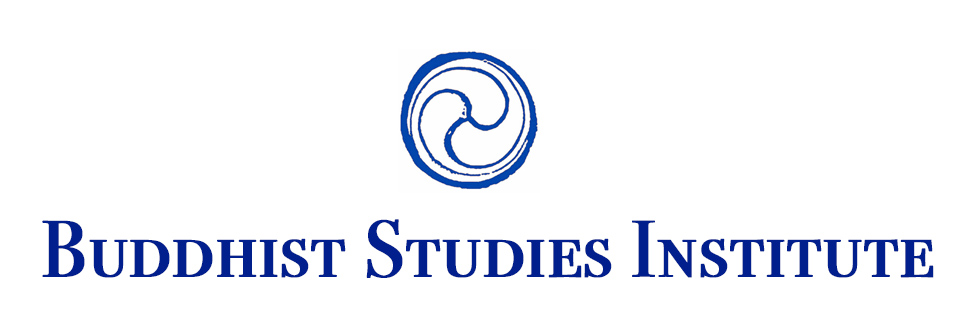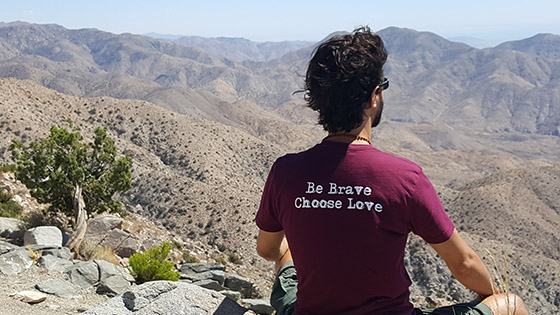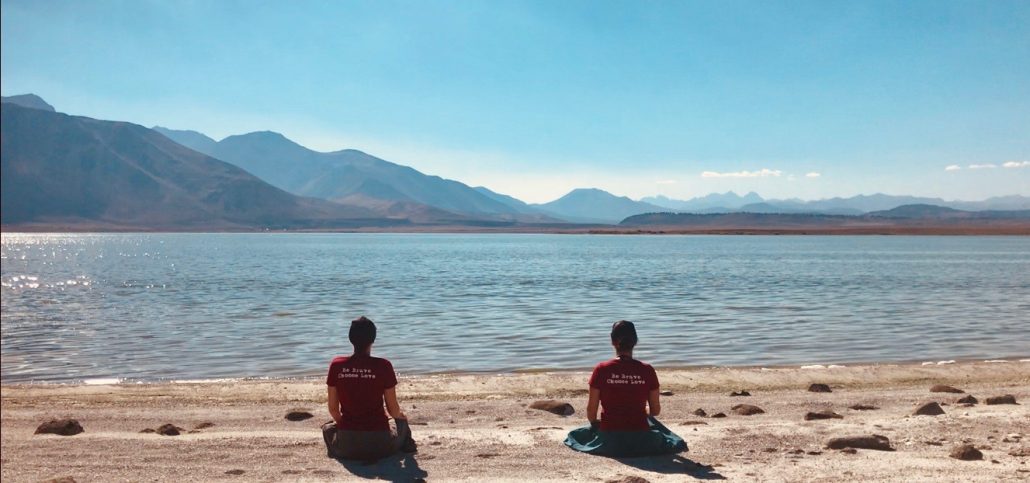Archive 2020-21 Meditation Instructor Training
150 Hour Certification Training – with Pema Khandro
Registration Open Until November 14th
Oct 31, 2020 – Feb 20, 2021
What People are Saying about Meditation Instructor Training
ABOUT MEDITATION INSTRUCTOR TRAINING
- Robust, 150 hours of In-Depth Training
- Self-Paced Curriculum & Live Classes
- Teaching Practicum & One on One Mentoring
- Traditional Meditation + Buddhist Philosophy + Buddhist Ethics
- Completely Traditional + Completely Current
- For Teachers Facing A Diverse Tumultuous World
The Meditation Instructor Training supplies the fundamental knowledge and experience necessary to lead meditation classes and one-day meditation intensives.
People all over the world have turned to Buddhist meditation as a source of wisdom. Meditation offers a powerful method to access a sense of spaciousness, peace and authentic presence.
The practical benefits of meditation are well documented. Research shows it improves mood, reduces stress (Brown & Warren 2003), it improves memory, visuospatial reasoning, sustained attention and executive brain function (Zeidan et al. 2010). It reduces sub-clinical depression and anxiety (Schreiner and Malcolm 2012).
From a Buddhist point of view, when we know how to meditate, we learn how to work with mind and emotions. We have a practice for unraveling conditioned scripts and unconscious habits. Meditation is a pathway to discovering human goodness by making peace with our mind. Ultimately it is a method for getting free from dissatisfaction, resolving confusion and waking up to see reality more clearly.
MEDITATION TEACHERS NEEDED
Equanimity, calm, peace, inner strength, resilience, centeredness… there are so many reasons the world needs meditation teachers.
Meditation Teachers can offer important tools for relating to these tumultuous times.
Meditation promotes mindfulness and equanimity – the ability to let emotional states arise and pass without becoming overwhelming. With mindfulness, we are able to become aware of our mind-states, rather than carried away by them. It promotes the state of equanimity, the ability to respond skillfully to situations. Instead of responding with knee-jerk reactions, blame, resentment and anger we can choose healthier responses, such as loving-kindness and compassion.
There are so many places where meditation can be taught. It can add a profound benefit to temples, yoga centers, health centers, schools, corporations, communities and healthcare settings. This training offers meditation instructors copious knowledge, both practical and experiential – so that you can offer high-quality classes in any setting.
ABOUT THE 5 MODULE FORMAT
The training includes a study of the postures for meditation, breathing techniques, the five key meditation techniques from Zhine, (also known “Calm Abiding), common obstacles to meditation, remedies for obstacles of meditation and more. We will also review the most important Buddhist teachings to support meditation practice – looking to the wealth of Buddhist philosophy for new perspectives on what is mind, how to work with thoughts and emotions, what is the body-mind connection and how body and mind can be harnessed for awakening.
MODULE 1 – START ANY TIME
Self Paced Courses & Quizzes – 45 hours
- Introduction to Buddhist Meditation (4 hours)
- Buddhist Ethics (6 hours)
- Empathy Training (5 hours)
- Buddhism as a Way of Life (9 hours)
- Excellent Path to Enlightenment – Module 1 (3 hours)
- Teachings on Karma (3 hours)
- Book Reading & quizzes on Anti-racism, Anti-sexism & Power structures (15 hours)
- Live Online Orientation – Sat, Oct 31, 2020, 10am-1pm PT – 3 hours
MODULE 2 – NOV 2020
Meditation Practice – 19 hours
- Daily Meditation & Self-reflection Journals – 30 min/day
- Live Online Workshop – Sat, Nov 14, 2020, 10am-1pm PT – 3 hours
- Study-Buddy Call – 15 minutes + Journal 1x/week – 1 hour
MODULE 3 – DEC 2020
Learning to Teach – 35 hours
- 22 Videos & Quizzes (11 hours)
- Includes Study with Meditation Instructor Manual, 47-page digital download
- Daily Meditation & Self-reflection Journals – 30 min/day
- Study-Buddy Call – 15 minutes + Journal 1x/week – 1 hour
- Live Online Workshop: Sat, Dec 19, 2020, 10am-1pm PT – 3 hours
WINTER BREAK: DEC 23 – JAN 1
MODULE 4 – JAN 2021
Teaching Practicum – 37 hours
- Teaching to Family & Friends – 9 hours
- Teaching in Your Community – 9 hours
- Daily Meditation & Self-reflection Journals – 30 min/day
- Study-Buddy Call – 15 minutes + Journal 1x/week – 1 hour
- Live Online Workshop: Sat, Jan 16, 2021, 10am-1pm PT – 3 hours
MODULE 5 – FEB 2021
Final Exams & Graduation – 9 hours
- Final Exam Online – 2 hours
- Final Teaching Practicum Group 1 – Sat, Feb 6, 10am-2pm PT
- Final Teaching Practicum Group 2 – Sat, Feb 13, 10am-2pm PT
- Final Transmission w/Pema Khandro, Teaching Vows & & Graduation – Sat, Feb 20, 10am-1pm PT
ELECTIVES
Additional Supports for your Practice – Choose 5 hours
- Introduction to Tantric Buddhism – AUDIO (1 hour)
- Non-duality in Tantric Buddhism – AUDIO (1 hour)
- Cultivating Lasting Change – AUDIO (30 min)
- Peace, Power & Meditation – VIDEO (1 hour)
- Bliss Yoga videos to support your body for meditation (2 hrs)
- Articles by Pema Khandro (2 hours)
TOTAL COURSE HOURS = 150
DATES FOR LIVE MEETINGS
SATURDAY GROUP WORKSHOPS
There are 6 Live Online Group Workshops. Attendance of all workshops is required for certification.
Saturdays, 10am – 1pm PT
October 31, 2020 – ORIENTATION
November 14, 2020 – Group Workshop
December 19, 2020 – Group Workshop
January 16, 2021 – Group Workshop
February 6, 2021 – Final Practicum Group 1
February 13, 2021 – Final Practicum Group 2
February 20, 2021 – GRADUATION
GROUP WORKSHOPS or OPTIONAL PRIVATE COACHING
If you must miss one or all of the scheduled group workshops due to timing, timezone, professional or family life, you may elect to receive private coaching in its place.
For each group workshop missed, you may schedule an hour of private coaching from one of the instructors or their assistants at the rate of $100 per session. Scheduling is based on the availability of the training instructors. To elect for this option, please contact Info@BuddhistStudiesInstitute.org
OVERVIEW OF KEY ASPECTS
Orientation & Introduction – Live Online
- Welcome
- How the Course works, Practical Overview and Questions
- Meeting with each of the participants
- Why Meditation Training? Why Online?
- What is Mind? A Buddhist Point of View
- Expectations
- Q&A
Lessons & Practice Videos
- Study the crucial points of meditation practice from home, at your own pace.
- You will receive new video lessons each week covering the essential points of Meditation practice and Meditation Instruction.
Exams
- Students will complete online quizzes reviewing the major principles of the video lessons they have received.
- Students will complete a final exam online at the end of the Fall quarter in order to progress to the teaching practicum.
Daily Journal
Students will be required to submit journal entries documenting practice sessions. Students are expected to maintain a daily meditation practice of at least 24 minutes per day throughout the entirety of the course. Journal questions include:
- What time you started practicing, what time you finished practicing
- What were the positive things about your practice today?
- Name one challenge about your practice today?
- Where did you practice?
- Which practice did you complete today?
Workshops – Live Online
- Students will meet with the instructors for online workshops, discussion, and evaluation. During the workshops, every student will have opportunities to lead meditation class and receive feedback from the instructors.
- Students will also meet with a study-buddy once a week to practice leading meditation.
Teaching Practicum
- Each student will lead 9 hours of meditation classes to friends and family, and submit review forms.
- Once confirmed by instructors, each student will lead 9 hours of meditation classes in a local community setting and submit review forms.
- It is the student’s responsibility to organize and arrange these classes within their local community.
- Due to COVID and public class restrictions, BSI will also offer alternative options for completing the practicum online.
- Students will be given instructions for which practices to lead and will discuss these experiences in the group workshops.
Final Transmission & Graduation – Live Online
- Students who complete all aspects of the training will be invited to the final transmission class and graduation.
SELF PACED CURRICULUM OVERVIEW 22 LESSONS
Introduction Lesson Zero: What is Mind?
- Taught by Pema Khandro
- What is Mind According to Buddhist Thought
- Understanding the factors of perception, experience, unconscious and identity
- How the ten factors of mind take place
- How does meditation work with the factors of mind?
- Tibetan Yoga – Naljorpas – Remaining in the Real
- Technical Overview Taught by Satya Shiva
- Meeting the participants and expressing the purpose of the training
- Overview of the Practicalities of the Course
- Answers to Technical Questions
Lesson 1: How to Sit – The Seven Point Posture of Vairocana
- Taught by Satya Shiva
- Detailed introduction to the 7 Point Body Posture and Bodhisattva posture
- A good seat – a good mind
- Daily Practice
- Guided Calm Abiding – 21 Breaths Meditation
Lesson 2: What is Meditation – Why Meditate?
- Taught by Pema Khandro
- Popular Goals for Meditation
- Meditation for relieving stress
- Health benefits for meditation
- Meditation as a spiritual practice
- Meditation as withdrawing the senses
- Goals for Meditation in Buddhism
- What is wakeful presence?
- What is Calm Abiding Meditation?
- Settling, Tranquility, and Equanimity
- Why is calm abiding necessary?
- Is calm abiding enough?
- Is non-thought the goal? Why or why not?
- The function of calm abiding
- The benefits of finding calm when coping with change, illness and death
- Daily Meditation
- Calm Abiding 21 Breaths
Lesson 3: Tradition & Context of the Practice
- Taught by Pema Khandro
- The Orientations of Buddhist Meditation
- Tibetan Buddhism: Distinctions in the Practice
- Tibetan Yogis and Contemplation (Nyingma Ngakpa)
- Overview of frameworks of contemplative traditions
- Why different methods to meet different needs
- Calm Abiding vs Insight Meditation
- Calm Abiding (Tib. Zhine, zhi gnas; Skt. Shamatha)
- Sequence of calm abiding and insight
- Preparing for Calm Abiding
- The importance of enlightened intent (Skt. Bodhichitta)
- Methods for cultivating enlightened intent
- Lifestyle and ethical considerations
- The goal of discovering self-existing wakefulness
- The Body Context
- Introduction to the mind-body relationship framed as winds, channels and spheres.
(Skt. prana, nadi, bindu; Tbtn. rtsa, rlung, thigle) - The importance of phases of meditation practice
- Brief introduction to the opening and closing contemplations
- The Meditation Tradition & Establishing Context for Clarity & Calm
- Introduction to the mind-body relationship framed as winds, channels and spheres.
- Daily Practice
- Preliminary Practice 2: Double the Exhale
- Calm Abiding Exercise 1: Twenty-one Breaths
Lesson 4: Ideal Place and Time
- Taught by Pema Khandro
- Ideal Times to practice
- Ideal Durations of Practice
- Ideal Clothing
- Ideal Seat
- Teaching in Non-Ideal Conditions
- Overview of the prayers for opening and closing the Practice
- Ideal Place – Traditional & Modern Considerations
- Preliminary Practice 4: Tactile Sensations
“If the conditions of tranquility are impaired, one may meditate intensively
for as long as a thousand years without achieving tranquil absorption.”
-The Bodhipathapradīpa
- Daily Meditation
- Finding a stable posture
- Preliminary Practice 1: Regulating the breath
- Calm Abiding Exercise 1: Twenty-one Breaths
Lesson 5: Mastering the Posture
- Taught by Aruna Rig’dzin
- Preparatory practices for sitting
- Secrets to the 7 Point Posture
- How to sit on the cushion
- How to sit in a chair
- Helping Others to Sit
- Props as Sitting Support for Tight Hips or Back Problems
- Half Lotus and Full Lotus
- Correct placement of the ankle in half lotus and full lotus
- Solutions for Pain and Body Limitations
Lesson 6: Preparation for Practice
- Taught by Satya Shiva
- Introduction to the preliminary somatic practice
- Preliminary Practice 3: Nine purification breaths
- Why Inner Yoga Practices settle the mind
Lessons 7: Abiding in Peace and Calm
- Taught by Pema Khandro
- Overview of the five main methods for finding calm
- Common factors in all the Calm Abiding Methods
- Structured exercises, unstructured spaces and non-elaborate meditation techniques
- Importance of periods of non-guided meditation
- What is ‘bad’ meditation, making sense of the dullness, agitation and impulses
- Meditation as a space for encountering what we are
Lessons 8: Abiding in Peace and Calm
- Taught by Pema Khandro
- Overview of the five main methods for finding calm continued
- Overview of four of the five preliminary exercises for synchronizing body and mind
- What is calm or tranquility? How is it distinguished from dullness?
- Step by Step Detailed Instructions for the 5 Main Methods to teach for accessing meditative presence
- Does meditation make the mind more busy?
- Practicing in ease versus practicing in tension and aggression
- Dealing with fidgeting and body movement, how much movement or stillness is required?
- Discerning distractions as soon as they arise
- The liberating power of focusing the mind
- Defining mental freedom as the power to concentrate on chosen objects
- Balance between effort and relaxation
- Quality vs Quantity – why it’s important
- What to do if the students are all distracted or struggling in the middle of the session
- Sticking with one method at a time
Lessons 9: Abiding in Peace and Calm
- Taught by Pema Khandro
- Overview of the five main methods for finding calm
- Samten (Dhyana) meditative stability
- Daily prayers opening prayers part 1 and Refuge prayer
- Refuge prayer without the word Refuge
- Concrete objects to tune into the non-concrete presence
- Rigpa – the Intrinsic quality like the wetness of water
- How to calm the emotional poisons which distort our vision, disturb our mind
- Formless meditation instructions and theory
Lesson 10: Abiding in Peace and Calm
- Taught by Pema Khandro
- Overview of the five main methods for finding calm continued
- What is the difference between Tibetan Buddhist Meditation and other meditation techniques
- How does lifting the gaze change the meditation
- Meditating on an external object
- The forceful aspect of Forced Calm Abiding
- What is the Ah Thigle? What is the benefit of using the Ah Thigle as an Object
- Step by Step Detailed Instructions for the 5 Main Methods to teach for accessing meditative presence
- Tips for Instructing Meditation for beginners and advanced audiences
Lesson 11: Abiding in Peace and Calm
- Taught by Pema Khandro
- Two factors that lead to the meditative state
- The importance of enlightened intent (bodhichitta)
- The intentional factor that leads to the meditative state
- Subtle Body as Mind
- Mind riding the Wind
- The Five Vital Winds
- Practicing with Body Speech and Mind
- The Symbolism and meaning of Om Ah Hung Practices
- Expressing enlightened intent in the opening and closing of practice
- Calm Abiding Practice with Sending Light
Lessons 12 – 14: Obstacles and Antidotes
- Taught by Pema Khandro
- Primary obstacles to meditation and their remedies
- Considerations for preventing obstacles to meditation
- Recognizing the source of obstacles
- Working with special cases – tips for students with depression, addiction, and trauma
- Uprooting every teacher’s worst obstacle
- Cultivating ethics & Discovering consciousness as ethical
Lesson 15: Obstacles and Antidotes in Diet & Lifestyle
- Taught by Satya Shiva
- Dietary & Lifestyle Considerations for preventing obstacles to meditation
Lesson 16: Teaching Methodology
- Taught by Pema Khandro
- Avoiding common pitfalls in teaching
- Discovering your authentic voice
- Integrating Meditation Teaching into your coaching practice, medical practice and other careers
- Facilitating groups in welcomes, check-ins, and discussions
- Avoiding sexist language and actions
- Skills for addressing Racism & Bigotry
- Remaining relevant
Lesson 17: Tips for Teaching in the Meditation Practicum
- Taught by Aruna Rig’dzin and Satya Shiva
- Finding places to teach classes
- How to set up your 3 hour meditation practicum
- The importance of serving under-served communities
- Identifying and approaching underserved communities
Lesson 18: The Stages of Meditation
- Taught by Pema Khandro
- Stages of developing practice
- The nine stages of developing the meditative state of calm abiding
- Signs of success on the path
- Practices for adapting to the stages of meditation
Lesson 19: The Goal of Meditation
- Taught by Pema Khandro
- The Goal of Meditation as a Buddhist Practice
- Advanced Considerations
- Understanding the mind, perception and its objects
- Non-self and open-ended experience
- Non-conceptuality, bliss, and clarity
- Working through meditative experiences without grasping
Lesson 20: Questions and Answers
- Taught by Aruna Rig’dzin
Lesson 21: Instructor Parameters
- Taught by Pema Khandro
- Secrets to Personal Discipline & Developing a Strong Practice
- Working with students
- Teaching Ethics – A Code to Live By
- Scope of Practice
Lesson 22: Bonus Class
- Taught by Pema Khandro
Final Words of Advice
- Taught by Pema Khandro
- Keeping a discipline after the course
- Developing ongoing education
- Values for a Meditation Instructor
- Heart Advice for Meditation Instructors
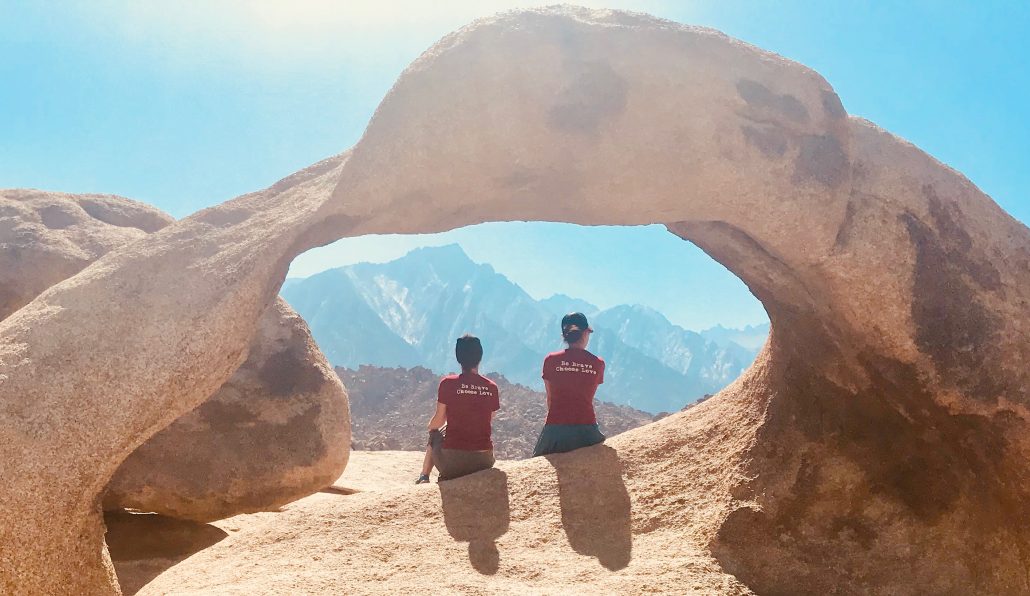
ABOUT TUITION
- Regular Tuition: $1895
- Payment plan: $2220 paid over four months @ $555/month
- All Access Pass / Sustainer Members: AAP Members wishing to join the training and be certified as a meditation teacher may sign a one-year contract with automated payments, and be certified upon completion of all payments and course requirements.
- Additional Member Discounts Available: See Membership for details
- Registration Fee: $500 non-refundable deposit is due upon registration to reserve space in the course.
- Suggested teacher donations: $108
Financial Aid Considerations
The course costs are set at a minimum fee already, with financial aid built into all tuition rates. Because we are a non-profit organization, the costs of all activities and overhead of our organization must be covered by the participants of the courses or donations and all courses are offered at below cost. For those who are experiencing genuine financial hardship and wish to enroll in the course, Financial Aid applications are available. (Applications must be received in advance.)
- POC Scholarships: Two Person-of-Color scholarships are available for this training. Email to Apply at Info@BuddhistStudiesInstitute.org
- Open Scholarships: Two Financial-Aid scholarships are available for this training. Email to Apply at Info@BuddhistStudiesInstitute.org
OVERVIEW OF OTHER COURSE REQUIREMENTS
- Submit Application
- Submit Release of Liability Form
- Complete all homework and assignments
- Daily practice throughout the duration of the course
- Must attend all live classes to graduate or:
- Missing Classes
- If a student must miss one or all of the scheduled group workshops due to timing, timezone, professional or family life, they may elect to receive private coaching in its place.
- For each group workshop missed, you may schedule an hour of private coaching from one of the instructors or their assistants at the rate of $100 per session. Scheduling is based on the availability of the training instructors.
- Missing Classes
- During Practicum:
- Complete teaching 9 hours of free meditation classes to friends and family
- Complete teaching 9 hours in an underserved community
- Graduation is subject to approval by faculty
- Tuition and dana (teaching donation) for the entire course must be complete before graduation
- Successful completion of all quizzes, final exam, and final teaching practicum
- Daily practice and completion of the daily journals must be complete before graduation
- All 150 course hours required for certification.
PREREQUISITES
- Minimum of three years of meditation practice experience or equivalent is suggested
- Ability to devote time and energy to the program, to attend and complete all course components, to take time away from work and other commitments in order to complete the study, practice and attend group sessions.
- Maintenance of a harmonious relationship with Instructors, Pema Khandro, co-leaders, and student community at the Buddhist Studies Institute.
- Ability to cover tuition and practice of Dana (teaching offering) in support of all program components (see tuition for details).
- Psychological health and stability:
- a history of emotional maturity and personal development, psychological development
- a history of psychological stability and well-being for the previous ten years.
CONSISTENCY OF CONDUCT
The Buddhist studies institute advocates for observation of Buddhist ethics, maintaining personal discipline and observing practices necessary for suitable health throughout the course and throughout one’s teaching career.
- Embodying Buddhist principles:
- generosity, discipline, patience, diligence, compassion, equanimity
- respect for teachers and sangha
- harmony with teachers and sangha.
- Ethical integrity:
- upholding the five precepts and Commitment to Buddhist ethics
- especially maintaining sobriety (in terms of being free from substance addictions)
- and refraining from sexual misconduct (includes refraining from romantic relationships with students and refraining from breaking vows or causing others to break their vows.)
- Refraining from hate speech (including hate speech on social media).
- Ethical commitment to refrain from engaging in sexual relationships with any students.
- The Buddhist Studies Institute follows a zero tolerance for abuse policy. Sexual relationships with students is grounds for having certification revoked.
- Continuing psychological and emotional stability and well being throughout the duration of the course.
- A wish to lead, based on service, gratitude, humility, and kindness rather than ego-driven ambition or narcissism. This includes:
- a conscious awareness of one’s own limitations;
- understanding the scope of one’s competence and authority;
- the willingness to draw on support from teachers and other professionals;
- adopting the practice of referring when students have needs outside one’s scope of competency; attribution of credit to sources/teachers when repeating or using their works.
- Personal and interpersonal maturity:
- ability to maintain a harmonious relationship with teachers and peers, emotional maturity to work through difficulties in practice and interpersonal difficulties, maintaining respect for past teachers and dharma community
- Respect for diversity:
- Respect towards other religious views, expressing kindness towards all beings regardless of race, ethnicity, gender, religion, sexual orientation or sectarian affiliation; respect for all types of Buddhism.
- Completion of required self-paced modules on anti-racism, anti-sexism, and trauma informed teaching
ABOUT THE TEACHERS
The course curriculum is designed and led by Lama Pema Khandro Rinpoche, internationally renowned teacher and scholar of Buddhist philosophy. Pema Khandro has a bachelor’s degree in Sociology, a Master’s degree specializing in Tibetan buddhism, she is currently completing her Ph.D. in Buddhist Studies. Her scholarly research focuses on the intellectual history of Buddhist meditation in Tibet, the history of Dzogchen and on gender studies. She is the founder of Ngakpa International and its three projects, The Buddhist Studies Institute, Dakini Mountain and the Yogic Medicine Institute. In her work as a Buddhist teacher she is an authorized Lama 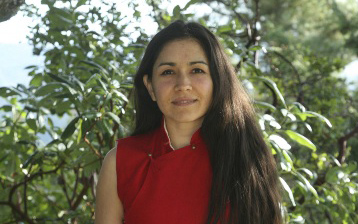 and lineage holder of the Nyingma and Kagyu traditions and was enthroned to carry on the lineage of her predecessor, the first Pema Khandro, a twentieth century yogini in Eastern Tibet. She is certified in two systems of natural medicine, Ayurveda and Tibetan medicine as well as three times certified as an Advanced Yoga teacher, and she has led dozens of courses in nutrition, meditation teacher trainings, yoga teacher trainings and natural medicine courses for health workers from every field. In her humanitarian work she has supported children, orphans and elders in the Himalayas. She has led a vibrant world-wide community since 1999. Through the Buddhist Studies Institute, she also offers a complete curriculum of training in Tibetan meditation and Buddhist Philosophy.
and lineage holder of the Nyingma and Kagyu traditions and was enthroned to carry on the lineage of her predecessor, the first Pema Khandro, a twentieth century yogini in Eastern Tibet. She is certified in two systems of natural medicine, Ayurveda and Tibetan medicine as well as three times certified as an Advanced Yoga teacher, and she has led dozens of courses in nutrition, meditation teacher trainings, yoga teacher trainings and natural medicine courses for health workers from every field. In her humanitarian work she has supported children, orphans and elders in the Himalayas. She has led a vibrant world-wide community since 1999. Through the Buddhist Studies Institute, she also offers a complete curriculum of training in Tibetan meditation and Buddhist Philosophy.

Aruna Rig’dzin was ordained in Nyingma Lineage by Pema Khandro Rinpoche in 2007. She is one of the Directors of Ngakpa International and the Community of Buddhist Yogis, as well as Director of the Yogic Medicine Institute. She is a NAMA certified Ayurvedic Practitioner and has over 18 years’ experience as an Advanced Yoga and Meditation Instructor. Aruna is passionate about healing, sustainable living and giving people the tools to live a vibrant, healthy and joyous life.
 Dr. Satya has been studying with Pema Khandro since 2001. She is the Chief Operating Officer for Ngakpa International since 2010, and is a member of the Board of Directors. Satya is the Panchakarma Clinic Director of the Yogic Medicine Institute since 2004, a licensed acupuncturist and doctor of Traditional Oriental Medicine, as well as a NAMA certified Ayurvedic Practitioner and Panchakarma Specialist. Her Doctoral Research specialized in Healthy Aging and Longevity, and she is a consultant helping to transition traditional “Residential Care for the Elderly” businesses toward more ecologically sustainable and alternative medicine based practices.
Dr. Satya has been studying with Pema Khandro since 2001. She is the Chief Operating Officer for Ngakpa International since 2010, and is a member of the Board of Directors. Satya is the Panchakarma Clinic Director of the Yogic Medicine Institute since 2004, a licensed acupuncturist and doctor of Traditional Oriental Medicine, as well as a NAMA certified Ayurvedic Practitioner and Panchakarma Specialist. Her Doctoral Research specialized in Healthy Aging and Longevity, and she is a consultant helping to transition traditional “Residential Care for the Elderly” businesses toward more ecologically sustainable and alternative medicine based practices.
FAQ – Frequently Asked Questions
At what point will I be ready to begin offering my free meditation classes to my community?
- I started practicing this morning at 7:30am and finished practicing at 8am.
- My knee problems didn’t bother me, my body felt good and stable!
- My mind was very active today.
- In the meditation room upstairs by the window, I found the light helped.
- I practiced the 21 breath practice. Also, the preliminary exercise was double breathing.
If I complete the training, will I automatically be a Certified Meditation Instructor and authorized to lead classes and one-day meditation retreats?
- Graduation is subject to approval by the faculty.
- Successful completion of all exams 80% or above, plus completion of the practicum.
- Daily practice and completion of the daily journals
- Documentation and completion meditation classes in your community.
- Satisfaction of all prerequisites.
